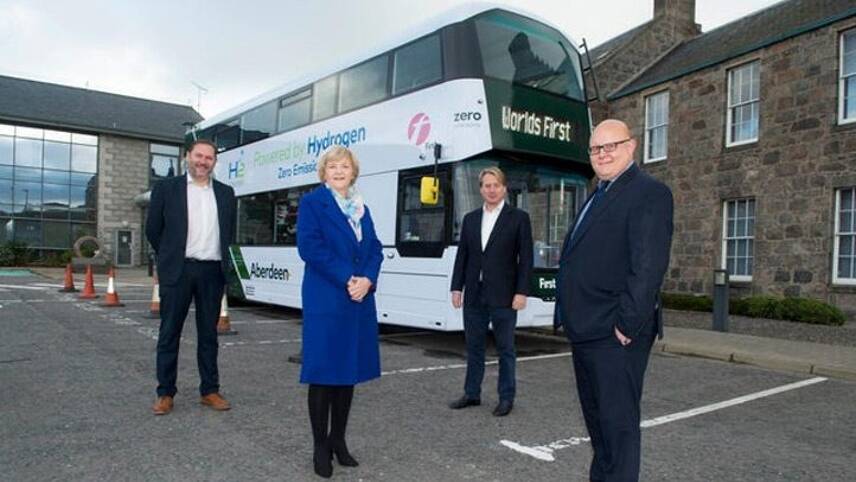Register for free and continue reading
Join our growing army of changemakers and get unlimited access to our premium content

Left to right: Council co-leaders Douglas Lumsden and Jenny Laing; Wrightbus' executive chair Jo Bamford and First Aberdeen's operations director David Phillips
The 15 buses were manufactured by Wrightbus and will be operated by First Group during the trials, which will last for “several weeks”. Passengers will not be permitted onboard until November and, in the meantime, drivers will receive training and final technical checks will be completed.
First Group claims that the buses have an equal or greater range than their electric counterparts and that they can refuel in around 10 minutes. Aberdeen notably opened its first hydrogen production and bus refuelling station in 2015 as part of a demonstration project led by the City Council and has since expanded its infrastructure in partnership with BP.
The Council jointly funded the new buses with support from the Scottish Government and the EU. In total, the project will cost £8.3m.
“We are responding, as a city and place, to the environmental imperative and also our role as a world leader in the energy sector as an economic driver for the city, region, Scotland and the UK,” Aberdeen City Council’s co-leader Cllr Douglas Lumsden said.
“By leveraging our unique assets and capabilities, we will help lead the world on the rapid shift to a net-zero future and support the global energy transition as a climate positive city.”
The Council does not have a hard deadline for reaching net-zero before Scotland’s overarching 2045 requirement. However, its net-zero vision paper includes plans to tackle hard-to-abate sectors like transport and heat and to improve building energy efficiency. First Group, meanwhile, is aiming to transition its entire Scottish fleet to zero-emission vehicles by 2035.
Global trend
It’s been a busy week for hydrogen announcements across the globe.
Spain this week approved its hydrogen strategy, headlined by an ambition to install 4GW worth of electrolysers by 2030. This will see the nation producing one-tenth of the EU’s hydrogen if the bloc’s member states align to its overarching hydrogen plans.
Across Spain, businesses collectively consume almost half a million tonnes of fossil-based hydrogen every year. The strategy outlines measures to replace at least one-quarter of this hydrogen with alternatives produced using renewables.
Madrid and the surrounding areas are expected to host the majority of new production capacity. The government has said €8.9bn will need to be invested in the region and would like to see the private and public sector collaborating to deliver this financing. Repsol and Iberdrola are expected to be key contributors.
Further afield, Toyota’s Motor North America arm has partnered with HGV manufacturer Hino USA to develop a hydrogen fuel cell truck. A demonstration vehicle with an 87-mile range is expected to be launched in early 2021
Toyota’s Japanese arm has also forged a new hydrogen partnership recently, with railway company JR East. Trials of a hydrogen-powered train are slated to begin in 2022.
Sarah George


Please login or Register to leave a comment.